What Anne Boleyn Can Teach Us About The Pitfalls of Power
Scheming seductress, hapless victim, political pawn, human cautionary tale ... Anne was all these things, and more.
Five hundred years ago, on March 1st, 1522, Anne Boleyn arrived at the court of Henry VIII like a gale force wind. She was nineteen. Where the English beauties were pink-cheeked and blue-eyed, Anne was slim and dark, possessed of great black eyes and a mantle of dark hair that fell to her knees. When she was feeling merry, her wit was arch and flirtatious. When she was angry, it cut like a whip. She went to Henry’s head like a very strong wine, and in his thirst to possess her, he shed his faultless wife, made a bastard of his only daughter, alienated his Catholic kingdom, wrested himself from Rome, pillaged nunneries and monasteries for their riches, and set himself up as Head of the Church of England, a title that bestowed upon him all the powers of a pope.
On that day five hundred years ago, Anne attended a jousting tournament with her sister, Mary Boleyn, the acknowledged beauty of the family, a woman the French king had once unchivalrously referred to as his “English mare” (the implication being that he often rode her.) For a few years, Mary had also shared a bed with Henry, who may or may not have fathered (but certainly never acknowledged) her son and daughter. Well-versed in the arts of chivalric love, so popular at the French court where she’d lately been a resident, Anne was disdainful of any woman who willingly fell into a man’s arms, Mary included. To Anne, Mary was a simpleton. Real power didn’t come from granting sexual favors. It came from withholding them. So when Henry came sniffing around, Anne already had her battle strategy ready: deny, deny, feign virtue, deny.
Notice, if you will, what tropes we’ve already assigned to our characters. How we view history often says more about ourselves than the figures we study. Mary is the whore, Anne the ice queen. But was this really the truth about who they were?
Anne surrounded herself with a bevy of restless, yearning admirers, among them her own cousin, the poet Sir Thomas Wyatt. Her favor, so widely sought, seemed hard to obtain, thereby enhancing her value in Henry’s mind. His narcissism demanded that so desirable a creature be his and his alone. She withheld; he wanted.
Despite our romantic notions that she held him in her thrall, at no time did Anne possess any real power. If a woman’s authority is dependent upon a man’s approval, it is no real authority. Almost from the moment of her sexual capitulation, he lost interest.
With the soullessness of any hair-splitting lawyer, Henry convinced himself that his first wife, Catherine of Aragon, previously married to his brother, Arthur, was childless because that degree of consanguinity was forbidden by spiritual law. In the Leviticus portion of the Bible, there are some vague passages about laying with a brother’s wife and it being an unclean thing. Even though the Pope had given an official dispensation to allow Henry and Catherine to marry, Henry seized on the opportunity to justify his callous behavior toward his wife. Although they had a daughter, Mary, her sex rendered her parents “childless” by legal parameters.
For nearly six years, “The King’s Great Matter” dragged on with no success, Anne bitterly complaining that she could have been honorably married by now had she not foolishly allied herself with the king, and Henry ever more brutal in his determination to rid himself of one wife and marry another.
It was his counselor, Sir Thomas Cromwell, who first proposed to Henry that he establish himself as Head of the Church of England. Doing so not only entitled Henry to the spoils of all the fabulous wealth accrued by the Catholic Church, it gave him vast swaths of land to dial out to his cronies, who then drove away the nuns and priests so they could graze sheep. Wool fetched a good price on the Flemish market, and keeping up appearances at the Henrician court was an expensive enterprise. Most importantly, Henry could now divorce Catherine and marry Anne.
She was pregnant by then. On the face of it, she’d played her hand well, staving off Henry’s advances until her last possible excuse ran out. But the minute she surrendered, Anne lost whatever control she may have exercised over him. Her “power,” such as it was, had always been in denying him sexual fulfillment; once sated, Henry moved on to other women, among them Anne’s cousin, Madge Shelton.
Despite Henry’s growing indifference, Anne would have survived had the fruit of her womb been male. Instead, on September 7, 1533, she gave birth to a squalling, red-haired daughter, Elizabeth, named in honor of both her mother and Henry’s. That event was soon followed by one miscarriage and then the stillbirth of a son, thus ensuring her downfall.
The charges levied against Anne were of a particular kind. She was accused of sex crimes of a morally opprobrious nature, including relations with her own brother and three gentlemen of the court, among them a lowborn musician. For a woman possessed of the pride and self-control Anne had, it is highly unlikely she was guilty of these offenses. But I do find it telling that Henry was so eager to besmirch her reputation, and by extension, that of her daughter, capitalizing on the “bad press” Anne had received as a scheming seductress. I suspect he was deeply angry and disillusioned, not only because of her failure to produce an heir, but because in the end, she was a woman like any other woman. Henry was a man who relished the pursuit, not the capture. In his eternal yearning for her, he’d felt energized, alive. Once he’d coursed that hare and brought it down, Henry discovered she was flesh and bone, just like any other animal, no unicorn after all.
In her lust for power, Anne matched Henry perfectly. Tudor England left little in the way of opportunity for women. As daughters, they exercised no authority over their lives. As wives, they were not only hamstrung by the law, but by etiquette demanding the circumspect behavior of married women. As mistresses, they enjoyed more freedom, but no safety. Once a man tired of a woman, he moved on. The only woman who enjoyed any power and autonomy over her own life was a widow.
Or a queen.
But once she attained the crown, Anne found it less exciting than she thought it would be. Instead of commanding the respect of others, she found herself awash in a sea of envy and malice. Instead of wielding power over loyal subjects, she was forced to engage in the geopolitical game of statecraft, with no clear victors. As plain Anne Boleyn, she’d been able to slip in and out of Henry’s apartments, undetected. As queen, her every movement was public and ceremonial, giving Henry ample time to hide his indiscretions.
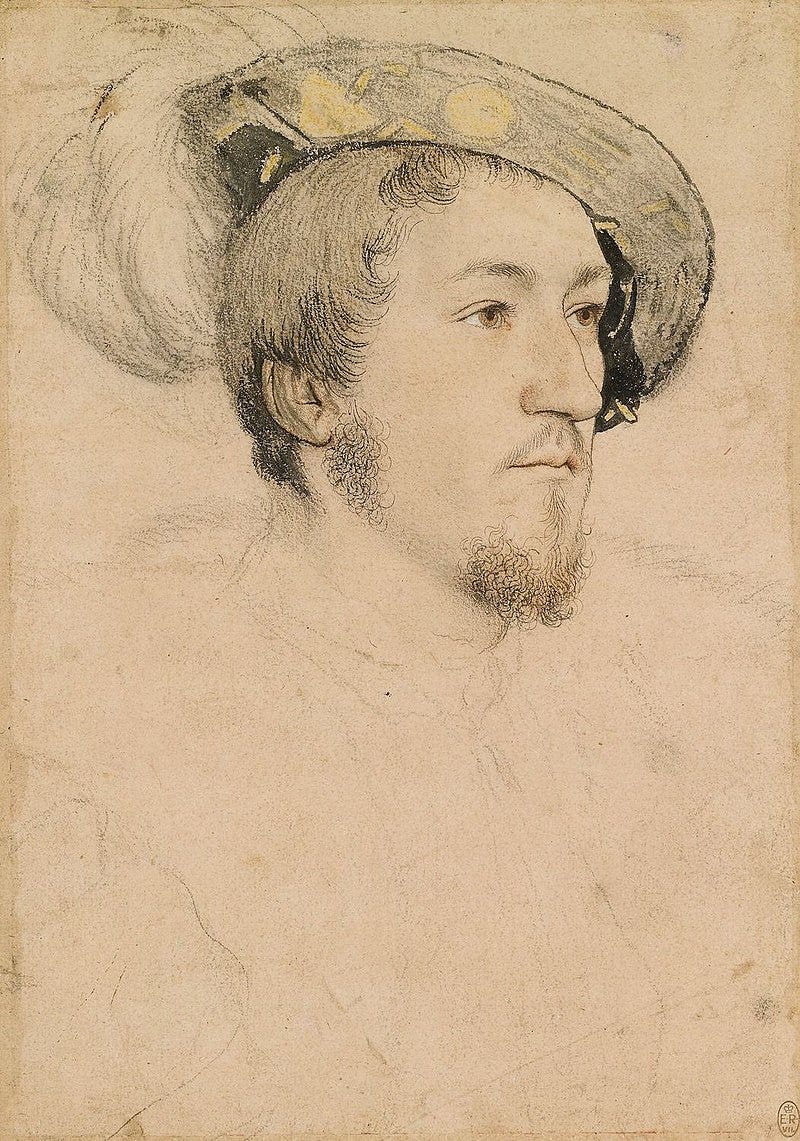
What a terrible thing it must have been for Anne to strike that Faustian bargain, only to later discover that power is a double-edged sword. More often that not, that sword will be used against you. Once she realized that her successor, Jane Seymour, was playing the same game she had by withholding sex from Henry, Anne must have been terribly frightened, not only for herself, but for her daughter, Elizabeth, who would go on to become England’s greatest monarch.
“Uneasy lies the head that wears a crown,” Shakespeare wrote in Henry IV. Anne and five men associated with her discovered that truth to their peril. She was beheaded on the north side of the White Tower on Friday, May 19th, 1536. The poem “O Death, Rock Me Asleep” is believed to have been authored by her. It certainly gives insight into her state of mind at the time.
O death! rock me asleep,
Bring me the quiet rest;
Let pass my weary guiltless ghost
Out of my careful breast:
Toll on the passing bell,
Ring out the doleful knell,
Let thy sound my death tell,
Death doth draw nigh;
There is no remedy.
Five hundred years have passed since the death of Anne Boleyn, and I still marvel at women’s lack of true agency. We are still “power adjacent.” We are still dependent on the good will of men to make or break us. Yes, we can own property and vote, but in places like Texas, women are still fighting for their reproductive freedoms. We have yet to achieve real economic parity.
Anne Boleyn wasn’t a hero. She didn’t die for our sins. But even now, she highlights a way out of the gender quagmire.
Go your own way, ladies. Wait for the approval of no man.
Are you an English history nerd like I am? If so, let your freak flag fly! I want to hear from you in the comments section below.


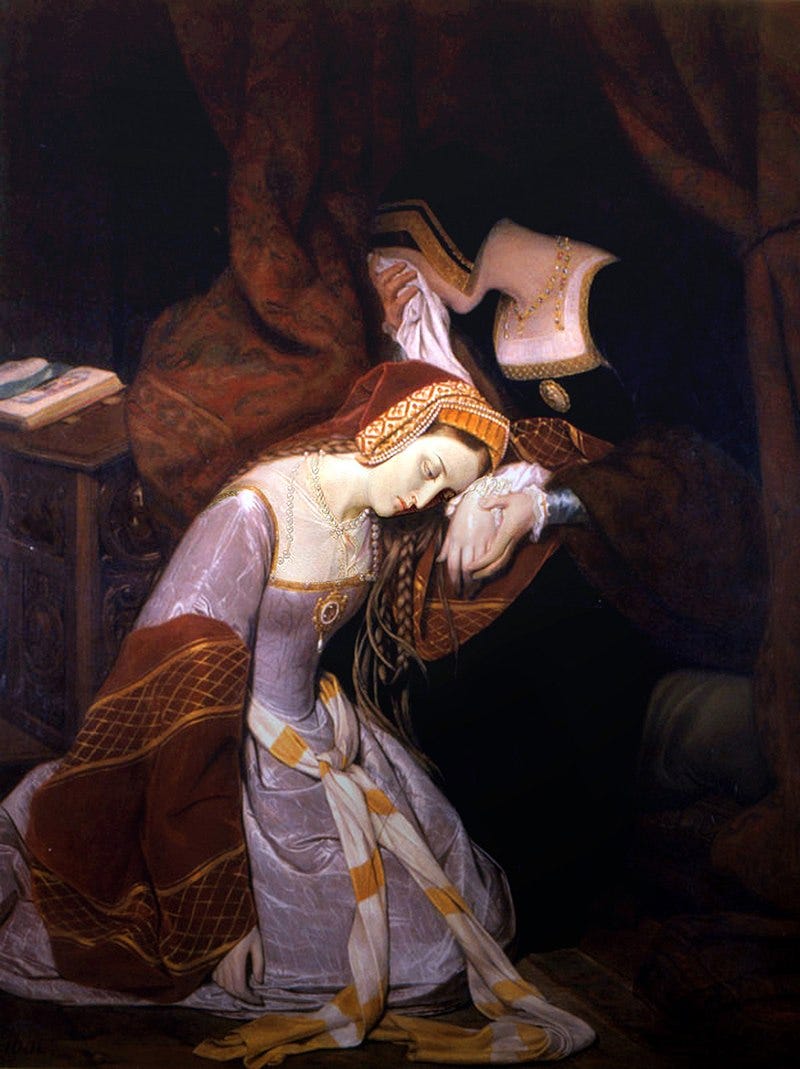
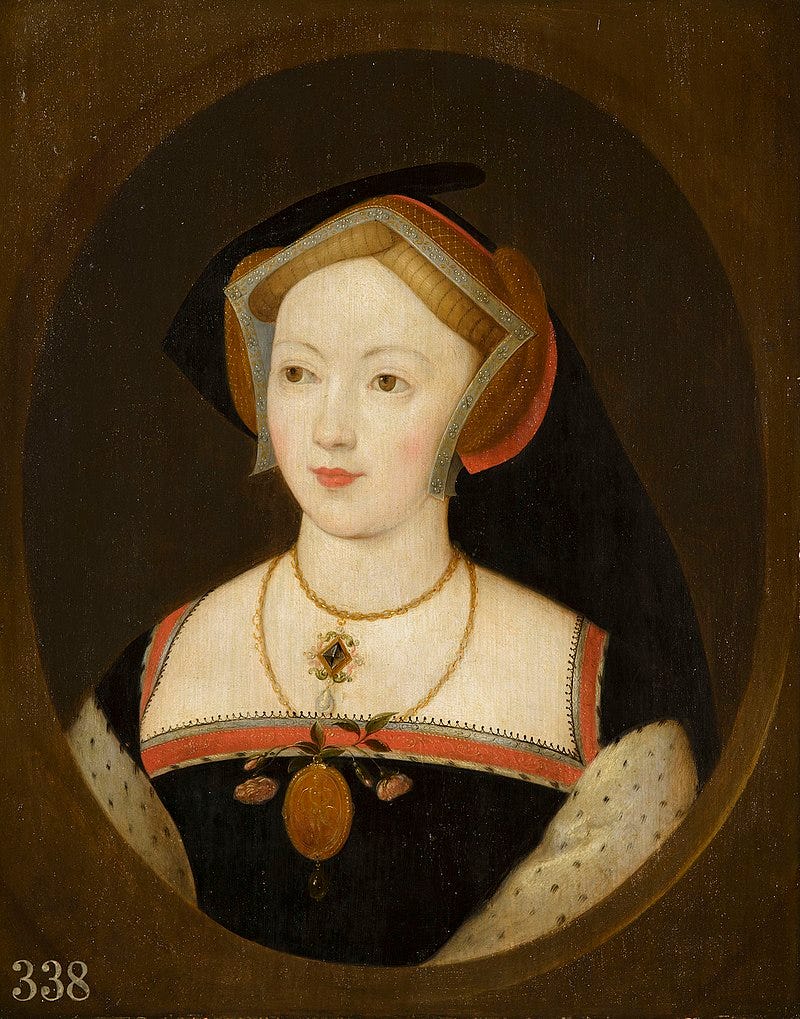

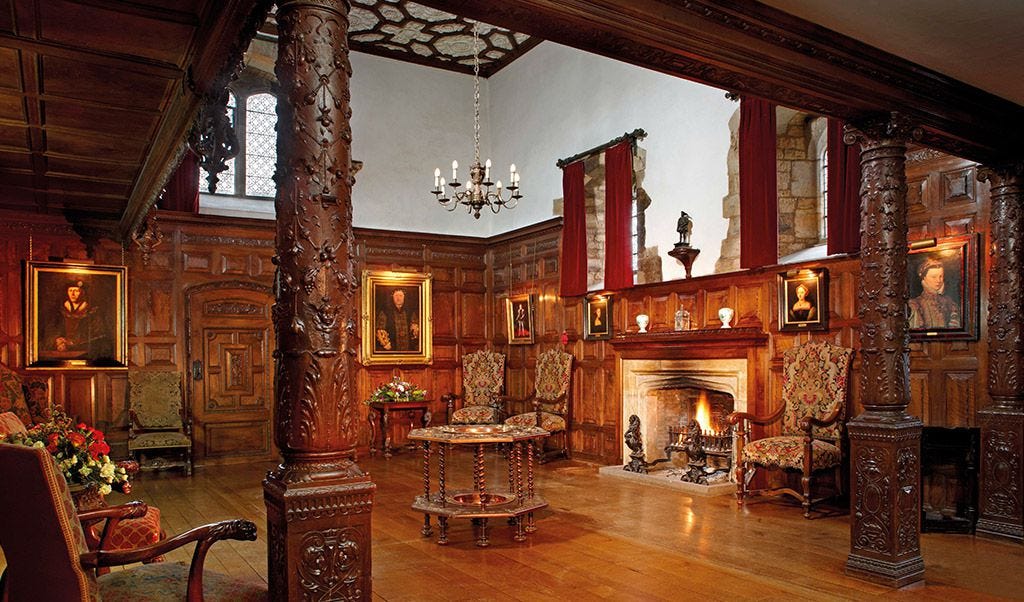
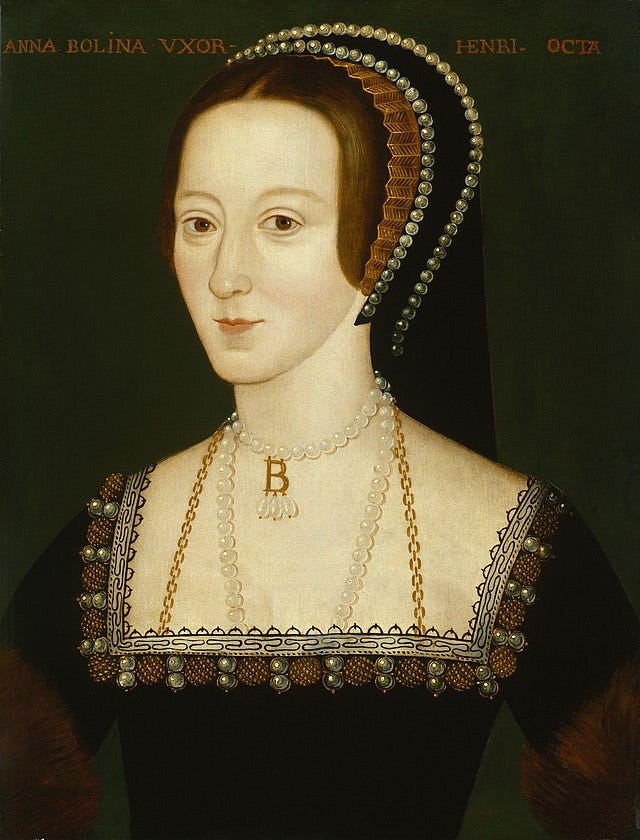
Henry, like most men, always thought with the wrong head. Of course, he also had the power to separate anyone's head from the rest of their body, which, as it turns our, can be a pretty awesome power...if you're the one wielding it.
The story goes that Henry composed "Greensleaves" as a lament for Anne (who, evidently, favored such raiment.) (I would also note that once you got past the chemise -- common term for the long shirt, both for men and women -- the sleeves on one's garments were tied on at the shoulder, and hence could be interchanged according to style and will.)
Phillipa Gregory, an excellent historian and novelist, has a book, "The Other Boleyn Girl," about Mary.
Mary Tudor -- "Bloody" Mary -- as ruthless and brutal as her regime was, probably murdered fewer "heretics" then Henry's chief minister Thomas More, the so-called and much valorized "Man For All Seasons." The "Smithfield Fires" were scarcely a candle compared to More's self-righteous savagery.
It didn't pay to be a "Thomas" associated with the Tudors. Thomas Seymour, Jane's brother, tried to hijack the crown by more or less kidnapping Edward (Henry's only male heir with a claim to the thrown.) Thomas More, Thomas Cromwell ... as they say, we should all strive to get a head. And the above mentioned Thomas Wyatt, led a rebellion against Mary that was crushed in an instant, and almost sent Elizabeth to the block (because the rebels were shouting her name.)
The phrase "nine day wonder" is in "honor" of the teenager Lady Jane Grey, who was briefly installed on the thrown prior to Mary's entrance into London. (For all of nine days.) Mary was inclined to show her mercy, but after Wyatt's rebellion no pretenders could be tolerated. She and her fop of a child husband Guildford Dudley went to the block on the same day. Guildford's older brother Robert would survive to become Elizabeth's life long friend and counselor.